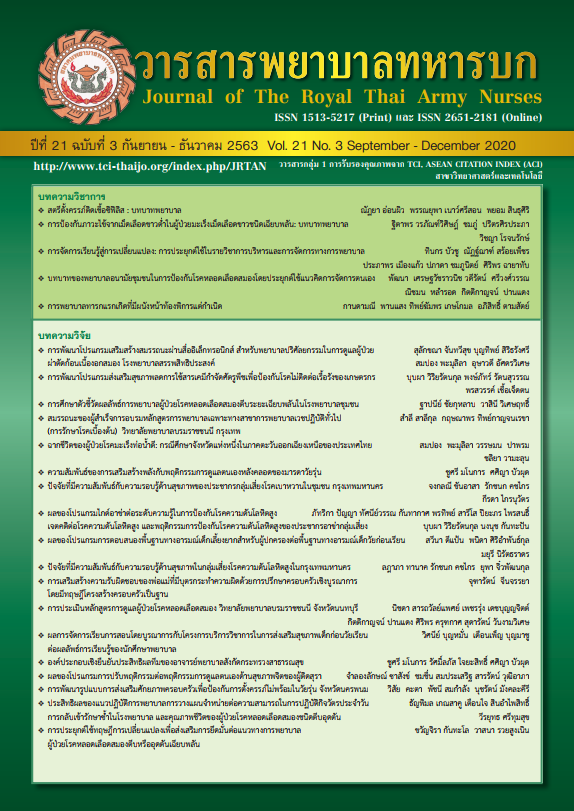The Roles of Community Health Nurses in Stroke Prevention Based on Self-Management Concepts
Keywords:
Self-management, Stroke prevention, community health nursesAbstract
Stroke is a major cause of mortality and lifelong disability. The important risk factors for the disease are inappropriate health behaviors such as lack of exercise, unhealthy diet, smoking and drinking, etc. These factors such as hypertension, diabetes mellitus, heart disease, and high cholesterol can lead to stroke. Stroke affects the quality of life of the patients including physical, mental, social, family and economic loss. Therefore, prevention of stroke is an important role of community health nurses. Self-management concepts can be applied to help the patients to change their behaviors. The process consists of 1. Setting goals 2. Data collection 3. Data processing and evaluation 4. Decision Making 5. Implementation and 6. Self-reflection. Community health nurses can apply these concepts to prevent the occurrence of stroke and to promote the quality of life of the patients and their families. These steps can also help develop their self-efficacy to manage the disease by adjusting their behaviors to be in accordance with their conditions of disease and satisfaction in daily life.
Downloads
References
World Health Organization. Global action plan for the prevention and control of on communicable diseases 2013-2020. [Internet]. 2013 [cited 2020 Feb 13].
International Health Policy Program Foundation. Burden of disease Thailand 2014. Nonthaburi: Graphico Systems; 2020. (in Thai).
Thai Bureau of Non Communicable Diseases [TB¬NCD]. World Stroke Day 2017 Campaign.
Lorig, K R, Holman, H. R. Self–management education: History, definition, outcome, and mechanisms. Annals of Behavioral Medicine. 2003; 26 (1),1-7.
Marsden, D. Quinn, R., Pond, N., Golledge, R., Neilson, C., White, J., et al A multidisciplinary group programme in rural settings for community-dwelling chronic stroke survivors and their carers: A pilot randomized controlled trial. Clinical Rehabilitation. 2010;24(4), 328–341.
Duangjinda M, Nimit – Arnun N, Roojanavech S. The Outcomes of Health Risk Communication Program Amongst High Risk Stroke Patients at Sub - district Health Promoting Hospitals in SamutSakhon Province. Journal of The Royal Thai Army Nurses. 2016; 17 (2): 59-67. (in Thai).
Damush, T.M.,Ofner, S., Yu, Z., Plue, L., Nicholas, G., & Williams, L. S. Implementation of a stroke self-management program: A randomized controlled pilot study of veterans with stroke. Translational Behavioral Medicine. 2011;1(4), 561–572.
Chantra R, Sansuwan R, Heeaksorn C. Care for Stroke Patients with a Multidisciplinary Team. Journal of The Royal Thai Army Nurses 2017; 18 (Suppl): 49-55. (in Thai).
Novak M, Costantini L, Schneider S, Beanlands H. Approaches to self-management in chronic illness. Seminars In Dialysis [Internet]. 2013
Sakulkaew, U. Paralysis: From broken blood vessels. (1st edition). Bangkok: S. Charoen Printing; 2011.
Skolarus, L. E., Zimmerman, M. A., Bailey, S., Dome, M., Murphy, J. B., Kobrossi, C., Dombrowski, et al Stroke Ready Intervention: Community Engagement to Decrease Prehospital Delay. Journal of the American Heart Association. 2016;5(5).e003331.
Creer, L.T. Self-management of chronic illness.Handbook of self-regulation. California: Academic. 2000; 601-629.
Bandura A. Self-efficacy: the exercise of control. New York: Freeman; 1997.
Sirited P, Thammaseeha N. Self-Efficacy Theory and Self-Healthcare Behavior of the Elderly. Journal of The Royal Thai Army Nurses. 2019; 20(2): 58-65. (in Thai).
Udlis KA.Self-management in chronic illness: concept and dimensional analysis. J Nurse Healthc Chronic Illn.2011;3: 130-139.
Sanee A. Self-management program in chronic diseases. Journal of The Royal Thai Army Nurses 2014 ;15(2):129-34. (in Thai).
Danyuthasilpe C. Promoting Self-Management for Patient with Chronic Obstructive Pulmonary Disease. J Nursing and Health Science 2017; 11(2): 97-104. (in Thai).
Walters JAE, Courtney-Pratt H, Cameron-Tucker H, Nelson M, Robinson A, Scott J, et al. Engaging general practice nurses in chronic disease self-management support in Australia: insights from a controlled trial in chronic obstructive pulmonary disease. Australian Journal of Primary Health [Internet]. 2012 Mar [cited 2020 Feb 13];18(1):74-9.
Poomsanguan K. Health and Health Promotion: Nurses’Important Role. Journal of The Royal Thai Army Nurses 2014; 15(2):10-4. (in Thai).
Chen L, Chen Y, Chen X, Shen X, Wang Q, Sun C. Longitudinal Study of Effectiveness of a Patient-Centered Self-Management Empowerment Intervention During Predischarge Planning on Stroke Survivors. Worldviews on Evidence-Based Nursing [Internet]. 2018 Jun [cited 2020 Feb 22]; 15(3):197-205.
Downloads
Published
How to Cite
Issue
Section
License
บทความหรือข้อคิดเห็นใดใดที่ปรากฏในวารสารพยาบาลทหารบกเป็นวรรณกรรมของผู้เขียน ซึ่งบรรณาธิการหรือสมาคมพยาบาลทหารบก ไม่จำเป็นต้องเห็นด้วย
บทความที่ได้รับการตีพิมพ์เป็นลิขสิทธิ์ของวารสารพยาบาลทหารบก
The ideas and opinions expressed in the Journal of The Royal Thai Army Nurses are those of the authors and not necessarily those
of the editor or Royal Thai Army Nurses Association.






